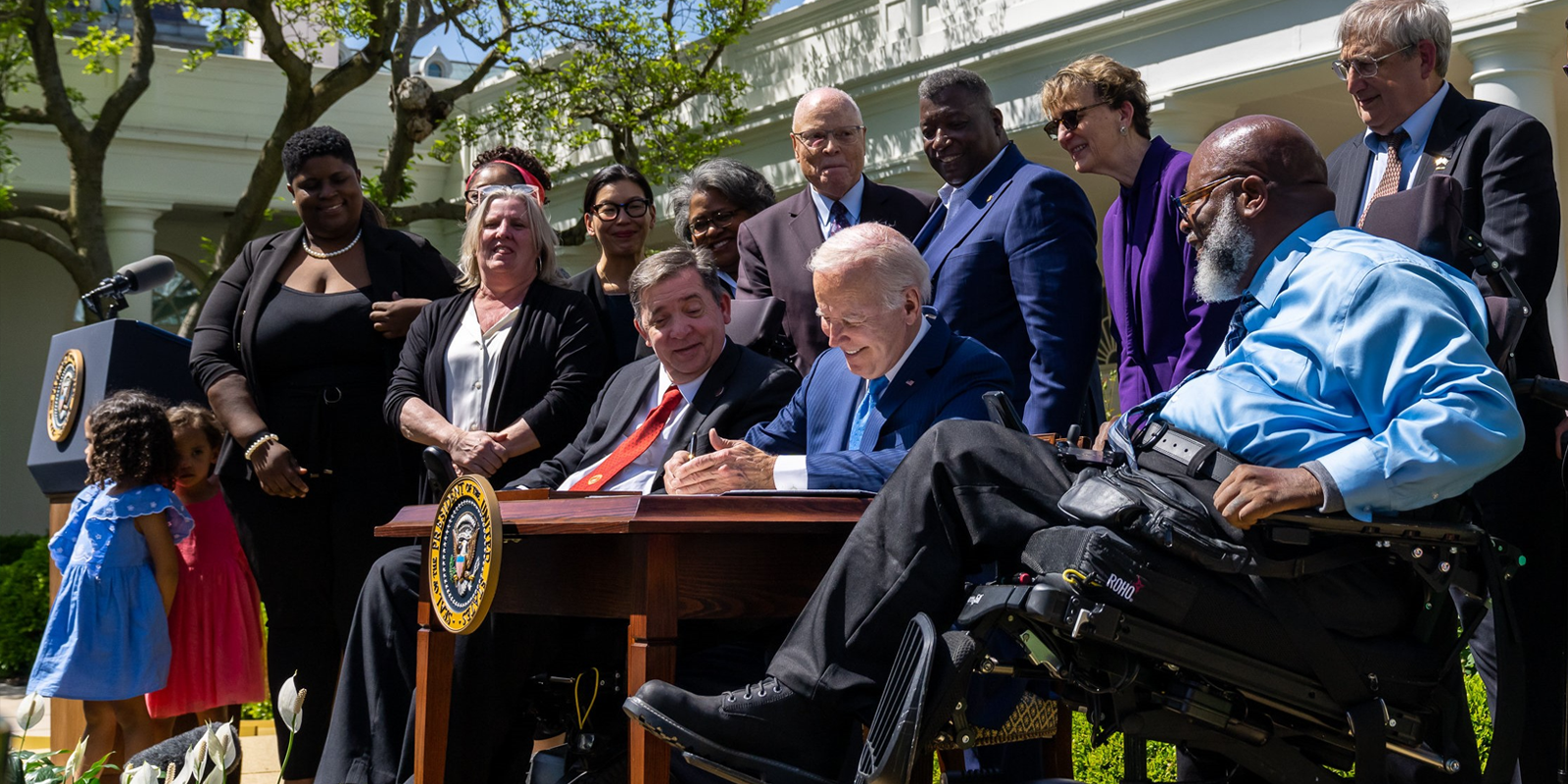President Joe Biden this week signed a major executive order to improve care for working families and support care workers.
The executive order came as care workers from across the country – including many AFSCME members – met in Washington, D.C., for a first-ever summit to highlight the critical need for a stronger care economy.
“Today, we celebrate a major milestone in our effort to address the crisis in care and win respect and recognition for care workers,” AFSCME President Lee Saunders said in a press statement responding to the executive order. Improving care, he added “is critical to building a strong, thriving economy. For too long, the care workforce, made up disproportionately of women of color, has been undervalued and underpaid.”
Saunders attended the signing ceremony for the executive order on Tuesday at the White House alongside the executive director of United Domestic Workers (UDW/AFSCME Local 3930), Doug Moore, who is also an AFSCME vice president, and UDW members.
Care workers summit
The event was held as care workers from across the country – such as family child care providers and home care providers – gathered with union leaders and leaders of advocacy organizations for the “Care Workers Can’t Wait Summit,” organized by a coalition led by the National Domestic Workers Alliance. The goal of the event was to educate the public about the importance of the care economy and the critical contributions of care workers, emphasizing the growing need for a strong care infrastructure for the future.
The summit featured individuals who shared their experiences working in the care economy, as well as labor leaders and members of Congress. While speaking at the event, Saunders urged care workers to persist in their struggle for respect, dignity and security in their jobs.
“I believe we are turning a corner,” Saunders said. “We are raising awareness, lifting up the role that care workers play in creating and maintaining a healthy society.”
Despite the progress, “we have to keep the heat turned up,” he added. “We have to stand up and speak out. We have to keep educating, organizing and mobilizing. We have to fight like hell every single day for the resources you need.”
Speakers and participants at the summit emphasized the essential function of care workers and family caregivers not only in protecting society’s most vulnerable but in making it possible for other essential workers to report to work.
They drew a stark contrast between what is expected of this workforce and what is offered in return. Workers put in long hours that often go unrewarded – despite 2016 regulations, which AFSCME fought for, making home care workers eligible for minimum wage and overtime protections. Their sacrifices are hardly ever acknowledged, and many care workers are forced to live at the edge of poverty, with few benefits, lack of access to health care and little opportunity to save for the future.
“This work is hard, but we do it because we care, because it’s essential, and because it’s the work that makes all other work possible,” said Sandy Moreno, a home care provider from California City, California, and a UDW member “We deserve better. I will never give up, and I will keep working for care workers so we can finally get the respect and dignity we deserve.”
Marilyn Smith, also a California home care provider and UDW member, answered questions from Moore in a session on the power of unions.
“I need someone to stand up for me and speak on my behalf when we come to the table,” she said. “We need a powerful union to stand behind us. Without the union, where would we be? … A union means you’re a part of something bigger than yourself. A union means you never face struggles alone. Everyone deserves that kind of support.”
Tough challenges that can be overcome – through unions
Miren Algorri, a family child care provider from Chula Vista, Calif., and member of Child Care Providers United (UDW/AFSCME Local 3930), spoke at a town hall-style event hosted by Sens. Bernie Sanders (D-Vt.) and Bob Casey (D-Pa.).
A second-generation child care provider, Algorri described the challenges providers hope to overcome through their union, which they formed in 2020 after nearly two decades of organizing. In fact, more and more care workers are finding their voice through their unions.
“Currently in California our real pay turns out to be less than $5 per hour, leaving us with pennies to make ends meet for our families,” Algorri said. “We can’t take off weekends or evenings because we work around the clock to take care of our community’s children … and yet we lack the resources to be healthy and to retire with dignity someday.”
Algorri ended in an upbeat tone to loud applause and cheers when she concluded that family child care providers “are now more than ready to turn down these broken systems to make the way for the futures we deserve.”
The Biden administration’s executive order will no doubt help care workers achieve their goals. It includes more than 50 directives to federal agencies to expand access to affordable care for working families while providing support for care workers and family caregivers. (More details are here).
“The actions we’re taking today are about dignity, security and peace of mind for working families and caregivers all across the country, and they’re good for the economy as well,” Biden said at the signing ceremony. “When I ran for president … I said I wanted to rebuild the economy from the middle out and the bottom up. … Let’s finish the job!”
